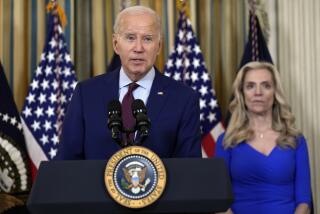Clinton to Call for Loose Reins on the Internet
- Share via
WASHINGTON — After a two-year study into the growing world of Internet commerce, the Clinton administration has decided not to call for new taxes or regulations on business conducted over the global computer network and instead will largely allow the private sector to determine how it will operate in cyberspace.
The administration’s stance, detailed in a report scheduled to be released by President Clinton on Tuesday, is a marked departure from the federal government’s practice of closely regulating other electronic networks, such as telephones, television and radio.
Administration officials and technology industry leaders contend that new laws and taxes could stymie development of electronic commerce, which, if left loosely regulated, is expected to reach $200 billion in the U.S. by 2000, according to industry analysts.
“Commerce on the Internet could total tens of billions of dollars by the turn of the century,” the report’s final draft says. “For this potential to be realized fully, governments must adopt a nonregulatory, market-oriented approach.”
Industry leaders who have seen draft versions of the report commended the administration’s approach, saying that businesses need the incentive of regulatory freedom to embrace electronic commerce, a step many corporations recently have been taking with trepidation. Consumers, too, have been cautious about making purchases online.
The report also highlights a stark shift in the administration’s policy toward adult material on the Internet after last week’s SupremeCourt decision striking down as unconstitutional a federal law that would have criminalized transmission of “indecent” material to minors over computer networks.
Although the administration had supported the law, it is now asking the industry to instead police itself through a ratings system and is advocating the use of software that lets parents block children’s access to objectionable Internet content.
“Unnecessary regulation could cripple the growth and diversity of the Internet,” the report states. “The administration therefore supports industry self-regulation, adoption of competing ratings systems and development of easy-to-use technical solutions . . . to assist in screening information online.”
The report, in many ways, is intended to set an international agenda for the Internet. The document advocates that other governments adopt a similar approach toward taxes and content regulations in an effort to make electronic transactions across national borders as seamless as those that now occur between states.
The administration is expected to petition the World Trade Organization this summer to classify the Internet a tariff-free zone for the sale of electronic goods and services, such as software purchased online.
The administration’s position on new domestic Internet taxes does not mean the network would turn into a tax-free environment. Sales taxes, levied by states, would still apply to goods bought over the Internet.
At the same time, the administration’s position may set the stage for a battle with state and local officials, some of whom have advocated placing special taxes on Internet access and transactions over the network.
The U.S. Conference of Mayors, the Council of Governments and the National League of Cities all have opposed legislation pending in Congress that would prevent state and local governments from placing new taxes on Internet commerce and use.
Some of those governments contend that the new taxes on Internet commerce are necessary to offset losses in some types of sales and excise taxes as more transactions are handled electronically.
After unveiling the report, Clinton is expected to issue a series of challenges to federal agencies, Congress and the private sector to implement specific recommendations, a senior administration official said Sunday.
Clinton also will set up a commission, to be chaired by Vice President Gore, that will be charged with overseeing the effort, which the president wants to be completed by Jan. 1, 2000, officials said.
*
The new policy was praised by several industry leaders who have seen draft versions of the report.
Despite the support for industry self-regulation, the administration plans to take an active role in two areas: children’s privacy rights on the Internet and the export of data-scrambling technologies.
The report calls for giving companies and advocacy groups a chance to devise technologies and practices to control the collection of personally identifiable information--such as names, addresses and telephone numbers--from children. If the issue is not given prompt attention, the document urges government action. Some privacy rights groups, however, have called for an immediate response from regulatory agencies, particularly the Federal Trade Commission.
The report urges continued government controls on the export of software with strong encryption, or information scrambling, technology.
* INTERNET DEBATE
Overseas, debate on Internet regulation is just beginning. D1






